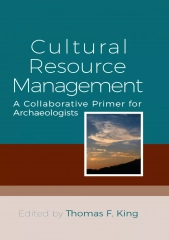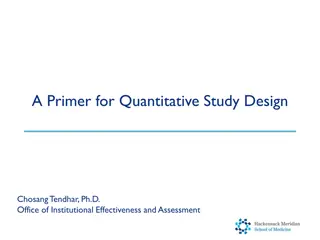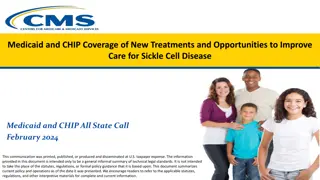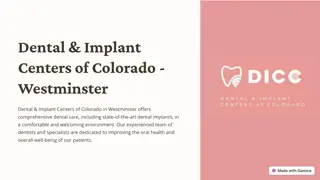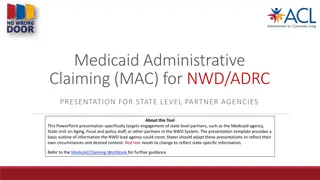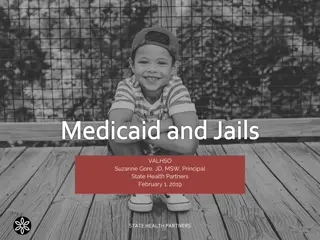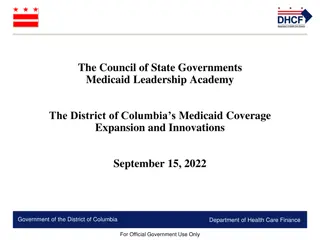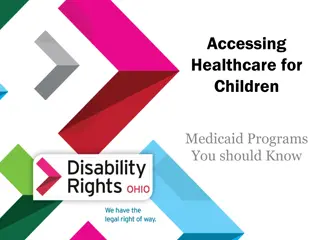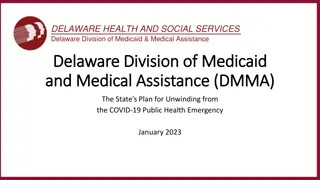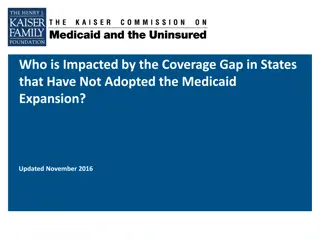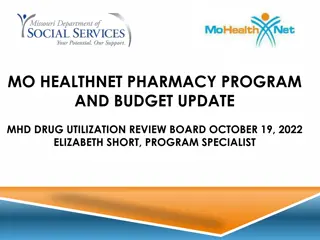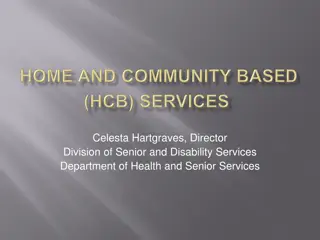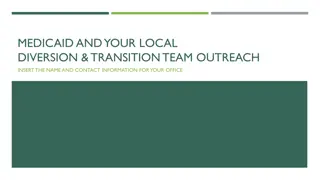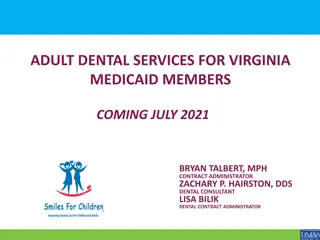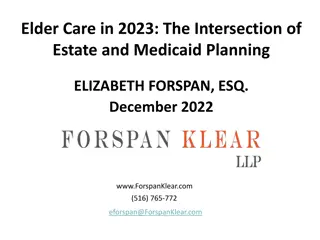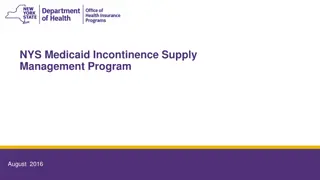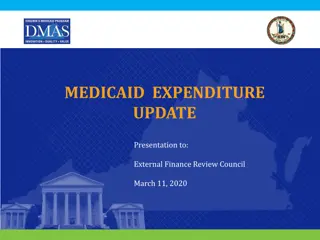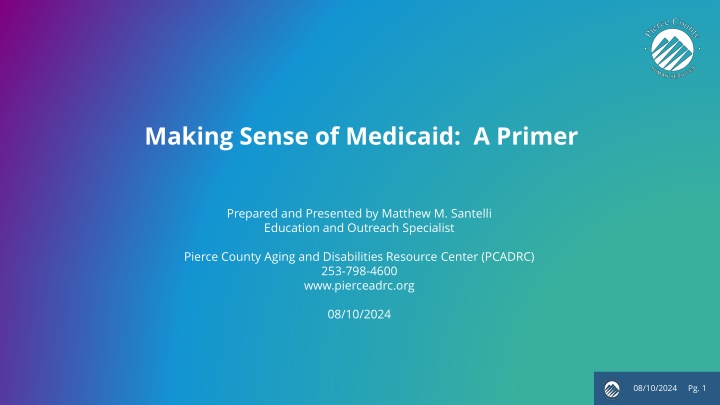
Medicaid Programs for Seniors and Disabled Individuals
Discover key insights into Medicaid eligibility, differences between Medicaid and Medicare, important considerations, and application requirements. Learn about asset evaluation, potential disqualifications, and the impact of resource transfers on Medicaid funding. Gain a clearer understanding of Medicaid for senior and disabled populations.
Download Presentation

Please find below an Image/Link to download the presentation.
The content on the website is provided AS IS for your information and personal use only. It may not be sold, licensed, or shared on other websites without obtaining consent from the author. If you encounter any issues during the download, it is possible that the publisher has removed the file from their server.
You are allowed to download the files provided on this website for personal or commercial use, subject to the condition that they are used lawfully. All files are the property of their respective owners.
The content on the website is provided AS IS for your information and personal use only. It may not be sold, licensed, or shared on other websites without obtaining consent from the author.
E N D
Presentation Transcript
Making Sense of Medicaid: A Primer Prepared and Presented by Matthew M. Santelli Education and Outreach Specialist Pierce County Aging and Disabilities Resource Center (PCADRC) 253-798-4600 www.pierceadrc.org 08/10/2024 08/10/2024 Pg. 1
Our goal today with this presentation is to make Medicaid programs understandable for our senior/disabled clients, their friends, their family members, and their neighbors. When reviewing Medicaid program eligibility, the term resource , which we will use, is defined the same as the term asset , and includes such things as real estate, bank accounts, stocks/bonds/mutual funds, life insurance/burial plans, and motor vehicles. - - - - - Disclaimer: The information provided during this presentation is not intended to serve as an exhaustive review of client eligibility and client obligations required through Medicaid coverage and/or specific Medicaid programs. Medicaid eligibility depends upon client income, resources, and functional need, as determined by DSHS financial workers and social workers. Medicaid eligibility and obligations can change over time, so as a result, today s presentation reflects the presenter s best knowledge of Medicaid programs at the time of the presentation. 08/10/2024 Pg. 2
A Few Important Things to Remember about Medicaid 1. Medicaid enrollment is not transferable from one state to another, so a new application is required when moving from state to state. 2. Our Medicaid review today will look at programs for single and married adults ages 19 and over. We will not look at children s programs, parenting programs, or refugee programs. 3. The term Medicaid is often confused with the term Medicare. Medicaid DOES PAY for long- term care at home or in a care facility. 4. As a reminder, Medicare is health coverage (red/white/blue card) issued by the Federal Government to most people at age 65, and to some people at an earlier age, if they have been collecting Social Security Disability payments for 24 consecutive months. Medicare eligibility is not linked to the income or resources of the recipient. Medicare DOES NOT PAY for long-term care at home or in a care facility. 5. Medicaid eligibility across different types of programs is ALWAYS LINKED to income and/or resources. Some Medicaid programs also require the recipient to exhibit a FUNCTIONAL NEED for a specific type of caregiver service in the home or in a care facility. Pg. 3 08/10/2024
A Few Important Things to Remember about Medicaid 6. Medicaid applicants are required to provide DSHS with consent to search financial records going back five years from the date of the Medicaid application (known as the Lookback Period) and used to determine if any disqualifying resource transfers may have occurred. DSHS financial workers can and will find both real estate sales/transfers and financial resource sales/transfers. A resource transfer during the Lookback Period may result in a period of ineligibility before Medicaid funding can be approved. Some Medicaid programs have Lookback Periods and others do not. Regardless, there is no waiver of the Lookback Period if a recipient moves from one Medicaid program to another. Some Medicaid programs also have an Estate Recovery provision which allows the State of Washington Office of Financial Recovery to recover the Medicaid funds spent on behalf of a recipient age 55 and over. In the event that a spouse incurs Estate Recovery upon death, there are protections in place for surviving spouses to delay Estate Recovery from happening while the surviving spouse is still alive. 7. 8. 08/10/2024 Pg. 4
A quick guide to todays presentation Modified Adjusted Gross Income (MAGI) Medicaid Supplemental Security Income (SSI) Medicaid Medicare/Medicaid clients (also known as DualEligible clients) Medicaid programs linked to functional need for long-term care in the home or in a care facility 08/10/2024 Pg. 5
Washington MAGI (Modified Adjusted Gross Income) Medicaid Washington MAGI (Modified Adjusted Gross Income) Medicaid is linked to INCOME ONLY (applicant not reviewed for disability or resources or functional need) and is a product of the Affordable Care Act. Many states still do not offer this program which has come to be known as MedicaidExpansion . Traditional Medicaid is linked to the recipient status as Aged/Blind/Disabled. The MAGI Medicaid program provides health coverage to adults ages 19 up to 65, who are not incarcerated, and who are not entitled to Medicare. Example: Joe is age 27 and has no income. He has resources of five thousand dollars in the bank which he saved when he was employed. He quit his job several months ago because he needed to be a live-in caregiver for his chronically ill mother. He is not planning to return to work since he needs to stay home to care for his mother. He is not disabled and he is not receiving any Social Security Disability or Supplemental Security benefits. He applies for MAGI Medicaid and is approved for MAGI Medicaid coverage simply because of having no income, even though he has resources. 08/10/2024 Pg. 6
Washington MAGI (Modified Adjusted Gross Income) Medicaid (cont d) MAGI Medicaid coverage requires no premium/no deductible/no copays for any of its covered medical and pharmacy benefits. Estate Recovery only applies to MAGI Medicaid clients age 55 and older but there is no Lookback Period because resources are not considered for eligibility. Effective July 1, 2024, the MAGI Medicaid single person income limit is $1732 monthly and the married couple income limit is $2351 monthly. 08/10/2024 Pg. 7
Washington MAGI (Modified Adjusted Gross Income) Medicaid (cont d) MAGI Medicaid ends at when Medicare begins at age 65 or younger if receiving SSDI. EVERYTHING changes for this group when they move on to Medicare (if eligible) at age 65 or after receiving a Social Security Disability Income cash grant (SSDI) for 24 months. The client MUST TAKE MEDICARE and then apply for Traditional Medicaid (if income and resource eligible). Medicare then becomes the primary coverage for most health services. MAGI clients not eligible for Medicare (such as SSI clients) still need to apply for Traditional Medicaid at age 65. 08/10/2024 Pg. 8
SSI (Supplemental Security Income) linked CN (Categorically Needy) Medicaid coverage Supplemental Security Income (SSI) is issued to a recipient deemed aged/blind/disabled as defined by the Social Security Administration. An SSI recipient is not eligible to receive Social Security Retirement or Disability due to not having enough earned income credit hours paid into the system. An SSI recipient is automatically eligible for Medicaid but still needs to apply for Traditional Medicaid coverage. The maximum SSI payment for a single person is $943 per month and for a married couple (both on SSI) is $1415 per month. The resource limit for a single person on SSI is $2000 and for a married person is $3000. SSI Medicaid clients will always be financially eligible for any of the remaining Medicaid programs that we will review during this presentation. SSI clients are allowed to own exempt resources and remain eligible. Examples of exempt resources are burial funds/burial plans, homes in which the client or the client spouse lives, personal belongings, and cars. 08/10/2024 Pg. 9
Medicare/Medicaid clients (also known as Dual Eligible clients) A Medicare recipient can have Medicaid as a secondary coverage, but there are different income limits for a Medicare/Medicaid recipient and there are also resource limits for a Medicare/Medicaid recipient. These Medicare/Medicaid clients are also known as Dual Eligible clients. These clients have Traditional Medicaid, not MAGI Medicaid. There is a five-year Lookback Period for eligibility. There is Estate Recovery for Medicaid services paid for a client age 55 and older. 08/10/2024 Pg. 10
Medicare/Medicaid clients (also known as Dual Eligible clients) (cont d) Medicare/Medicaid clients are eligible based on their income and resources. Income eligibility for a single person starts at $943 per month and for a married person starts at $1828 per month. The single person resource limit is $2000 and the married person resource limit is $3000. These recipients are allowed to own exempt resources and remain eligible. Examples of exempt resources are burial funds/burial plans, homes in which the client or the client spouse lives, personal belongings, and cars. 08/10/2024 Pg. 11
Medicaid eligibility for Medicare recipients through the Medically Needy spenddown program The Medically Needy spenddown program is challenging for even professionals to understand, so we encourage senior/disabled clients and their families to contact our Pierce County ADRC for guidance and more information on this program at 253-798- 4600. 08/10/2024 Pg. 12
Medicaid eligibility for Medicare recipients needing long- term care at home or in care facilities due to limited income/resources and due to functional need for care For the following married couple descriptions, we are assuming that only one spouse is seeking Medicaid-funded care. As a result, only the income of the spouse seeking care is reviewed for Medicaid eligibility. COPES program for long-term care in the home: This program provides in-home care for senior/disabled clients (age 18 and over) who require help to meet their daily personal care needs. Care hours can vary depending upon client need. Care can be provided by a licensed, contracted care agency caregiver or by any adult (except for the client spouse) who completes a fundamentals of caregiving class and passes a criminal background check. 08/10/2024 Pg. 13
Medicaid eligibility for Medicare recipients needing long- term care at home or in care facilities due to limited income/resources and due to functional need for care A single person can keep monthly income up to $2829. A spouse of a married person on COPES services can keep all of their own income AND some income from the spouse on services for housing costs. Single resource limit is $2000 and married resource limit is $68,301. Clients may have a financial participation if their income is above the single or married income limit. There is Estate Recovery for these services for clients over the age of 55 and there is a five- year Lookback Period to check for resource transfers which can impact eligibility. 08/10/2024 Pg. 14
Medicaid eligibility for Medicare recipients needing long- term care at home or in care facilities due to limited income/resources and due to functional need for care (cont d) TSOA program for long-term care in the home: This program also provides in-home care for senior/disabled clients (limited to age 55 and over) who have functional impairments which require caregiver assistance. Income limit for care receiver is $3772 per month whether single or married. There is no financial participation for this program. Single resource limit is $71,394 and married resource limit is $139,695. Care hours limited to a maximum of 20 per month and there is no Medicaid coverage. Care can be provided by an agency caregiver or any other eligible adult (not the spouse). There is no Estate Recovery and no Lookback Period for this program. 08/10/2024 Pg. 15
Medicaid eligibility for Medicare recipients needing long- term care at home or in care facilities due to limited income/resources and due to functional need for care (cont d) Medicaid-funded long-term care in an Assisted Living Facility (ALF) or Adult Family Home (AFH): Single person resource limit is $2000 and married person is $71,394 (after one this amount must be held in the name of the spouse who is not on services). For a single person, the cost of care depends on the monthly payment rate as established by the DSHS HCS social worker CARE assessment. The monthly payment rate is the amount of Medicaid payment that an ALF or AFH will receive over the course of a month for caring for a resident on Medicaid funding. The monthly payment rate for Medicaid is usually lower than the facility private pay rate. The client pays their whole monthly income (less their $100 Personal Needs Allowance or PNA) to the ALF or AFH, and Medicaid pays the remaining cost of client care to the facility. 08/10/2024 Pg. 16
Medicaid eligibility for Medicare recipients needing long- term care at home or in care facilities due to limited income/resources and due to functional need for care (cont d) One exception to the financial participation rule occurs if the client is married, then the client pays $740 of income to the care facility, and income above that amount can be kept by the spouse for household living expenses. Example: Jean applies for Medicaid-funded ALF care for herself with the help of her Pierce County ADRC case manager. Jean s monthly Social Security income is $1000. Her DSHS social worker CARE assessment determines that the DSHS monthly Medicaid payment rate to the ALF is $2400. Jean moves into the ALF and out of her $1000 SS income she pays $900.00 to the ALF as her monthly financial participation and she keeps $100.00. DSHS pays the ALF the remainder of her monthly payment rate which is $1471.12. 08/10/2024 Pg. 17
Medicaid eligibility for Medicare recipients needing long- term custodial care in a Skilled Nursing Facility SNF Medicaid funding for long-term custodial care in skilled nursing facilities: Basically, the client qualifies for Medicaid funding for SNF facility long-term (custodial) care if the client income is less than the Medicaid nursing home rate plus any regular medical expenses. The client must also meet resource limits as a single person at $2000.00 or as a married couple at $71,394.00. In most cases the Medicaid benefit will start once the client s Medicare benefit is exhausted at the SNF, which usually occurs about 21 days after admission. 08/10/2024 Pg. 18
Medicaid eligibility for Medicare recipients needing long- term custodial care in a Skilled Nursing Facility (cont d) The client must have functional need for SNF level of care. The five-year lookback period and estate recovery provisions (if over the age of 55) are in place for this type of Medicaid benefit. During the first six months of the client status with Medicaid funding at the SNF, the client is allowed to keep a portion of their monthly income to pay the costs (such as rent/mortgage, property taxes, insurance, and utilities) to keep their current home or apartment but only if the client can declare their intention to return home and only if the attending physician at the SNF agrees in writing. 08/10/2024 Pg. 19
Medicaid eligibility for Medicare recipients needing long- term custodial care in a Skilled Nursing Facility (cont d) Otherwise, the client will pay to the SNF facility their monthly financial participation, which will usually be their full monthly income less $100 PNA if they are single, or, if they are married, their full monthly income less $100 PNA and other household living expenses to support a spouse who is still at home. 08/10/2024 Pg. 20
RESOURCES For more comprehensive information about these programs and other senior/disabled resources, visit Washington Law Help at www.washingtonlawhelp.org. For more information about Medicare benefits, visit www.medicare.gov or call 1-800-633-4227. For more information about Social Security benefits, visit www.socialsecurity.gov or call 1-800- 772-1213 . To apply for MAGI Medicaid for a client, visit www.wahealthplanfinder.org. To apply for Medicaid spenddown, SSI, COPES, TSOA, or SNF Medicaid for a client, visit www.washingtonconnection.org. For more information and assistance to apply for these Medicaid programs, the Family Caregiver Support Program, and many other senior/disabled programs and services available through our Pierce County ADRC, visit www.pierceadrc.org or call 253-798-4600. 08/10/2024 Pg. 21

